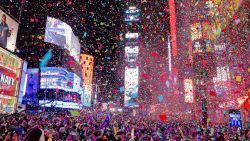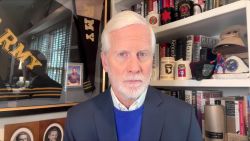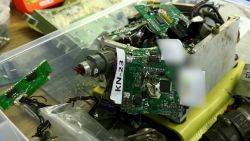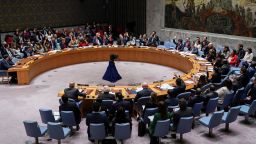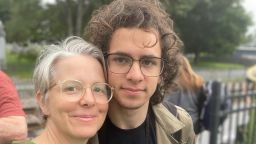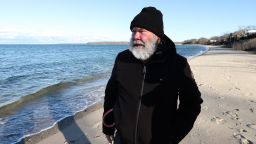Authorities across the US are working to ensure New Year’s revelers’ security this weekend, particularly in New York, where law enforcement officials say the war in Gaza has contributed to the concern of lone-wolf attacks, though they stress there is “no specific reporting regarding any threats.”
A joint threat assessment based on an analysis from 10 law enforcement agencies — the FBI, the US Department of Homeland Security and the New York Police Department among them — says the Israel-Hamas war “has created a heightened threat environment.”
The “Intelligence Community remains concerned about lone offenders using online platforms to express threats of violence against Jewish, Muslim, and Arab communities, as well as committing simple, unsophisticated attacks that are difficult to detect in advance,” the assessment obtained by CNN says.
The concern may be most prevalent in New York, where the FBI and the police department will monitor for potential threats Sunday from a large command center and amid an enhanced security perimeter as Times Square crowds count down to midnight – likely the highest profile New Year’s celebration of all, with an estimated audience of 1 billion worldwide. Demonstrations that could crop up related to the violence in Gaza also are on officials’ radar.
New York Mayor Eric Adams and the city’s police leaders said Friday there were no specific threats to celebrations in Times Square but added, “We’re gonna be ready to respond” to any potential problem.
The worries, while pronounced ahead of the holiday, are not new: Law enforcement across the United States has been especially vigilant since Hamas attacked on October 7 and as Israel’s siege of Gaza since then has intensified. The threat assessment obtained by CNN points to a series of false bomb threats early this month against synagogues and the shooting last month of three Palestinian students in Vermont as cases that could have been motivated by the Middle East conflict.
And one need not look far for an example of an attack in Times Square on New Year’s Eve by a so-called lone wolf, a reference to someone who might be radicalized to carry out violence but is not part of a formal extremist group: Last year, a 19-year-old characterized by FBI official Robert Kissane as a “homegrown violent extremist” radicalized by online propaganda was shot by police after he allegedly attacked three officers at a security checkpoint; he has pleaded not guilty and is awaiting trial.
This year, large, live televised events “remain an attractive target for foreign terrorist organizations,” as well as “domestic violent extremists,” the assessment notes.
“We’re in a heightened threat environment. We’ve been in that heightened threat environment really since October 7,” Kissane told CNN in an interview at a command center where officials from numerous partner agencies will monitor and investigate potential threats.
The day Hamas fighters poured across Israel’s border, killing 1,200 and taking dozens hostage, was “something of a flashpoint,” and the ongoing conflict “is certainly motivating and inspiring people to do bad things,” said Kissane, the special agent in charge of the FBI’s Counterterrorism Division at its New York Field Office and the Joint Terrorism Task Force. But New York frequently hosts large events, he noted, and the New York Police Department, the FBI and their partners work well together.
“I would argue there’s no place in the world that is better positioned to put on an event like the New Year’s Eve ball drop,” he said, emphasizing there is “no specific and credible threat” to this weekend’s Times Square event.
Protests present added concern, officials say
Authorities have expanded the security perimeter around Times Square – a move made in part due to last year’s attack, the city’s Chief of Patrol John Chell said – to keep cars off nearby major streets so police could move quickly toward an emergency. And they’ll rely on a myriad of tools and technology, like: cameras, a specially equipped police helicopter and drones, police countersniper teams in skyscrapers and bomb detection dogs that can catch a whiff of explosives, even in a crowd from 100 feet away.
Officials also have expressed concerns about potential demonstrations related to the war in Gaza, with the assessment noting they could disrupt “critical infrastructure” or events – or become targets themselves.
Some demonstrations in recent months have led to confrontations with police, as protesters decry the mounting civilian death toll in Gaza: More than 21,000 Palestinians have been killed since October 7, according to the Health Ministry in the Hamas-controlled enclave. As recently as Christmas Day, six people were arrested in New York during a pro-Palestinian demonstration after protesters clashed with officers, CNN affiliate WABC reported.
“There’s an added concern because of some of the protests you have been seeing,” Adams said Tuesday, nodding to an effort last month to disrupt the lighting of the Rockefeller Center Christmas tree. “And we’re sure that there’s going to be some type of attempt this year to use that stage for some other concerns that people are having.”
Since October 7, the New York Police Department has seen more than 1,000 protests across the city, Chell told CNN. And the department fully expects protesters on New Year’s Eve, just like at the Rockefeller tree lighting and during the Thanksgiving Day parade.
“It’s a massive operation that we prepare for all year,” Chell said of New Year’s Eve in Times Square. “You’re talking 1.2 million spectators in a close, confined area … The eyes of the world are on us. We have an awesome responsibility to keep everyone safe, to keep New Yorkers in a good place and having fun and protect the whole community.”
This is a developing story and will be updated.
CNN’s John Miller reported and wrote this story from Los Angeles; Nicki Brown and Dakin Andone reported and wrote in New York. CNN’s Mark Morales and Zenebou Sylla contributed to this report.


